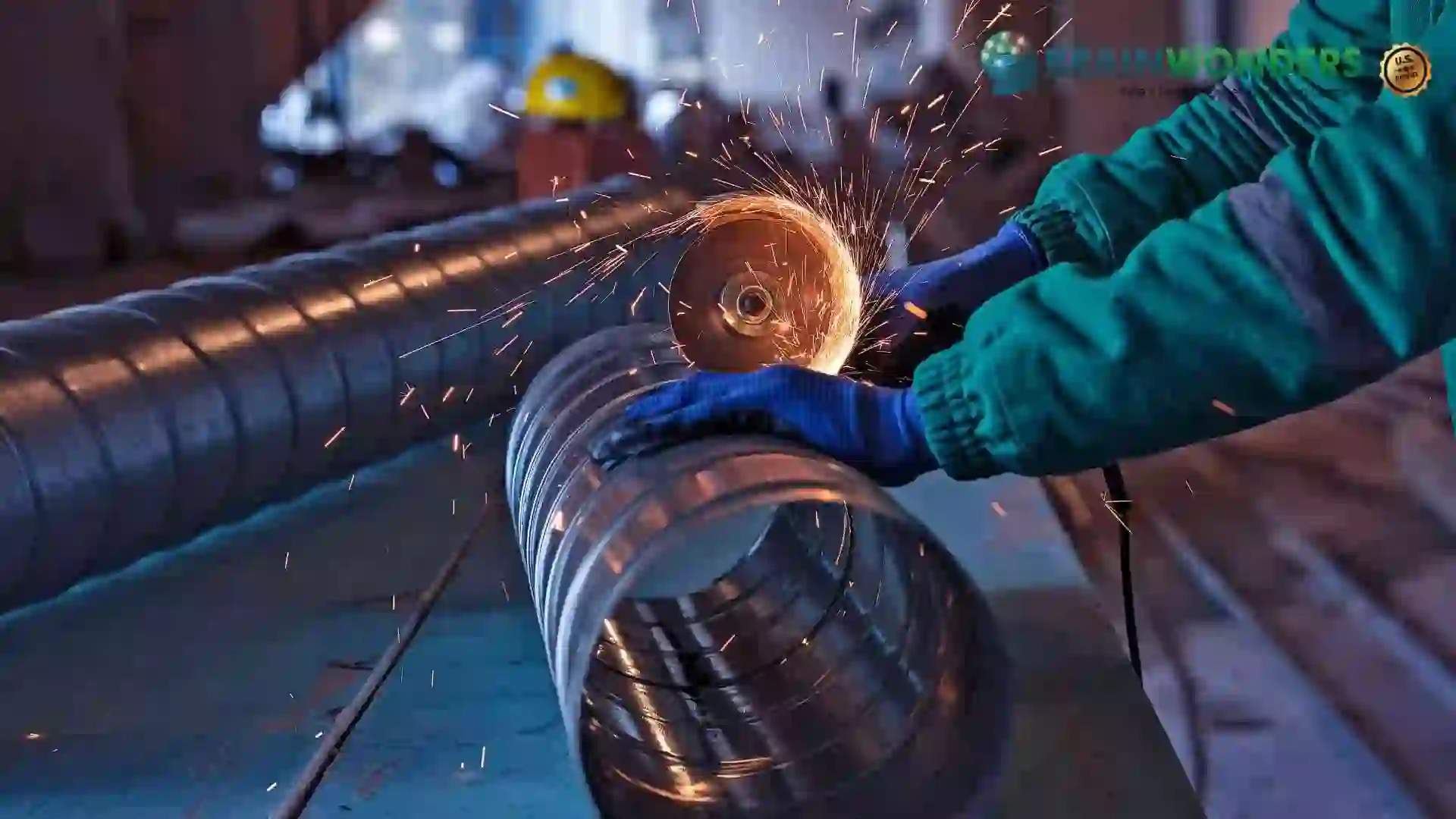How to become a Metallurgist
Overview, Courses, Exam, Colleges, Pathways, Salary

Overview
Who is Metallurgist ?
Materials scientists that specialise in metals such as steel, aluminium, iron, and copper are known as metallurgists. They often work with alloys, which are metals blended or additional components to form materials with desired qualities. They conduct research, develop, manage, and advise on processes used to extract metals from their ores and procedures used to cast, alloy, heat treat, or weld refined metals, alloys, and other materials to make commercial metal products or develop new alloys and processes. They design and build metal products and structures ranging from small precision-machined components to massive engineering pieces. Civil engineering, aircraft manufacturing, automobile engineering, and the military sector are among fields where metallurgists may operate. These professionals are also known as metallurgical engineers or material science engineers.
Typical day at work
What does Metallurgist do?
- Monitor all microscopic samples and determine metal specifications such as structure and erosion.
- Manage all metallurgical processes, prepare charts and graphs and prepare appropriate reports for all investigations.
- Provide support to all engineering projects and develop appropriate materials and ensure efficient and smooth operations.
- Perform tests on fixed equipments and provide support to all inspection and reliability groups.
- Analyze all fixed equipments, perform failure analysis and prepare appropriate reports.
- Evaluate all reports, perform regular examination with help of methodological system.
- Manage all work, prepare appropriate codes and classify various materials.
- Coordinate with machinery departments and suppliers and perform tests on various raw natural resources.
Abilities and Aptitude needed
What are the skills, abilities & aptitude needed to become Metallurgist?
- Analytical skills – metallurgical engineers use advanced methods and technologies to research the properties of metals and devise improved techniques for extraction and manufacturing, both of which require strong analytical skills
- Math and science skills – thorough knowledge of mathematical and scientific principles is a necessity in this role, as metallurgical engineers need to make calculations and understand how metals react
- Team coordination – most metallurgical engineers work with teams that can include manufacturing, extracting, and refining personnel, so they should be able to effectively collaborate with these teams
- Problem-solving skills – metallurgical engineers need excellent problem-solving skills to determine innovative ways to improve processes and resolve issues related to manufacturing and design
- Communication skills – written and verbal communication are central to this role, since metallurgical engineers need to communicate with their teams and prepare reports related to their findings
Salary
Salary for Metallurgist?
Salary of a Metallurgist is as follows :
- Minimum Monthly Salary for Entry-Level Metallurgists: The starting salary for entry-level metallurgists can vary based on location, industry specialization, and educational background. In India, novice metallurgists typically earn a monthly salary ranging from approximately INR 25,000 to INR 40,000 as they commence their careers in the field. This initial salary provides a foundation for metallurgists to gain practical experience and contribute to metallurgical processes.
- Maximum Monthly Salary for Experienced Metallurgists: Experienced metallurgists, particularly those who have demonstrated expertise in specific metallurgical techniques or have worked on complex projects, have the potential to earn higher monthly salaries. Their earnings could range from approximately INR 60,000 to INR 1,20,000 or more, reflecting their advanced knowledge, problem-solving abilities, and significant contributions to metallurgical research, development, and production.
- Annual Salary Range for Junior and Accomplished Metallurgists: Junior metallurgists, starting their careers with limited experience, might expect an annual salary ranging from approximately INR 3.5 lakhs to INR 6 lakhs. As metallurgists gain significant expertise, specialize in particular metallurgical processes, and undertake leadership roles, they can aspire to an annual income ranging from INR 7 lakhs to INR 15 lakhs or more. Accomplished metallurgists, often with advanced degrees and a track record of successful projects, can command higher salaries based on their contributions to innovative materials development and manufacturing processes.
- Highest-Paying Job Opportunities and Scope: Metallurgists have lucrative opportunities in industries such as manufacturing, aerospace, automotive, mining, and materials research. Those specializing in materials testing, quality control, advanced alloy development, and process optimization tend to have a higher earning potential. The scope of metallurgy is promising, as metallurgists play a crucial role in developing new materials, improving existing processes, and ensuring the quality and integrity of metal-based products. With the constant demand for advancements in materials science, sustainable practices, and technological innovations, skilled metallurgists are expected to be in high demand. This growth offers substantial opportunities for career progression, specialization, and contributions to various industries.
Pathways
How to become an Metallurgist?
Entrance Exam
Entrance Exam for Metallurgist ?
Courses
Which course I can pursue?
Best Colleges
Which are the best colleges to attend to become an Metallurgist?
Industries
Which Industries are open for Metallurgist?
Metallurgists have diverse industries open to them due to their expertise in understanding the properties, behaviours, and processing of metals and materials. Here are some industries where metallurgists can find employment opportunities:
- Manufacturing Industry: Metallurgists are essential for the manufacturing of various metal products, such as steel, aluminium, and other alloys. They play a crucial role in ensuring manufactured goods' quality, durability, and performance.
- Aerospace and Aviation: Metallurgists contribute to developing high-performance materials used in aircraft, spacecraft, and related components. They focus on creating lightweight yet strong materials that can withstand extreme conditions.
- Automotive Industry: Metallurgists are involved in designing and testing metals for automobile parts, ensuring safety, durability, and fuel efficiency. They work on improving engine components, chassis materials, and safety features.
- Mining and Extraction: Metallurgists in this industry extract metals from ores, refine them, and optimise extraction processes to maximise resource efficiency and minimise environmental impact.
- Energy and Power Generation: Metallurgists contribute to developing materials used in power plants, including materials that can withstand high temperatures and corrosive environments in turbines, boilers, and other equipment.
- Oil and Gas Industry: Metallurgists in this sector work on corrosion-resistant materials for pipelines, drilling equipment, and offshore structures, ensuring the integrity and safety of oil and gas operations.
- Research and Development: Metallurgists are employed in research institutions, universities, and laboratories to conduct cutting-edge research in materials science, exploring new alloys, processes, and applications.
- Defence and Military: Metallurgists contribute to developing advanced materials for military equipment, including armour, weaponry, and specialised vehicles.
- Medical Devices and Biomedical Engineering: Metallurgists play a role in developing biocompatible materials used in medical implants, surgical instruments, and diagnostic equipment.
- Construction and Infrastructure: Metallurgists contribute to developing strong and durable materials used in construction, bridges, and other infrastructure projects.
- Consumer Goods: Metallurgists produce everyday items like kitchen utensils, appliances, electronics, etc.
- Nuclear Industry: Metallurgists work on materials for nuclear reactors, ensuring safety, stability, and radiation resistance.
- Environmental and Sustainable Practices: Metallurgists may develop environmentally friendly and sustainable materials and processes, contributing to eco-friendly practices.
- Consulting and Technical Services: Metallurgists provide expertise as consultants, offering advice on material selection, process optimisation, and quality control to various industries.
- Jewellery and Art: Metallurgists with specialised knowledge in precious metals contribute to producing jewellery and artistic creations.
internship
Are there internships available for Metallurgist?
Metallurgy internships offer valuable hands-on experience for students and aspiring metallurgists to apply theoretical knowledge in real-world settings. Here are some potential industries and organizations where internships for metallurgists may be available:
- Manufacturing Companies: Many manufacturing companies, especially those involved in metal fabrication, aerospace, automotive, and consumer goods, offer internships where metallurgy students can gain practical experience in materials testing, quality control, and production processes.
- Mining and Extraction Companies: Interning with mining and extraction companies provides insights into ore processing, metallurgical testing, and refining processes used to extract metals from raw materials.
- Aerospace and Defense Industries: Internships in these sectors allow students to work on developing and testing high-performance materials for aircraft, spacecraft, and military applications.
- Research Institutions and Laboratories: Universities, government research labs, and private research institutions often offer internships focused on materials science, allowing students to participate in cutting-edge research projects.
- Energy and Power Generation Companies: Interning in the energy sector exposes students to materials used in power plants, turbines, and energy infrastructure, focusing on performance under extreme conditions.
- Automotive Manufacturers: Interns can work on projects related to materials selection, testing, and development for automotive components.
- Oil and Gas Companies: Internships in this sector may involve corrosion testing, material selection for pipelines and equipment, and research into new materials for harsh environments.
- Consulting Firms: Metallurgy interns in consulting firms can assist with materials analysis, failure investigations, and providing client recommendations on material-related challenges.
- Biomedical and Medical Device Companies: Interning in the medical field allows students to work on the development of biocompatible materials for medical implants and devices.
- Environmental and Sustainable Practices: Some internships focus on sustainable materials and processes, exploring ways to minimize the environmental impact of metallurgical practices.
- Jewellery and Art Studios: Interns interested in metallurgy's artistic applications can work with jewellers and artists to learn about working with precious metals and alloys.
- Metallurgical Testing Laboratories: These labs offer internships for hands-on experience in testing and analyzing the properties of various metals and alloys.
- Automotive and Aerospace Research Centers: Research centres dedicated to automotive or aerospace advancements often provide internship opportunities for metallurgy students to contribute to innovative projects.
- Materials Manufacturing Companies: Companies that produce unique materials, such as superalloys or advanced composites, may offer internships to students interested in these specialized fields.
- Steel and Iron Foundries: Internships in foundries provide exposure to the casting and production processes of metals like steel and iron.
Career outlook
What does the future look like for Metallurgist?
The future for metallurgists is promising and dynamic. As industries advance technologically, metallurgists will be crucial in developing innovative materials for aerospace, automotive, renewable energy, and other sectors. The demand for sustainable and lightweight materials and a focus on environmental responsibility will drive research into new alloys and production methods. Metallurgists will be at the forefront of ensuring material integrity, enhancing product durability, and optimizing manufacturing processes. Moreover, metallurgists will contribute to revolutionary breakthroughs in materials design and performance with the rise of additive manufacturing (3D printing), nanotechnology, and advanced simulations. Adaptability to evolving technologies and a commitment to sustainable practices will be essential for metallurgists to thrive in this ever-evolving landscape of materials science and engineering.







